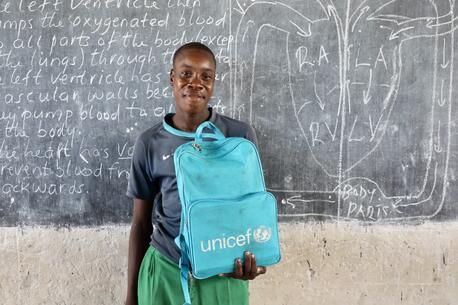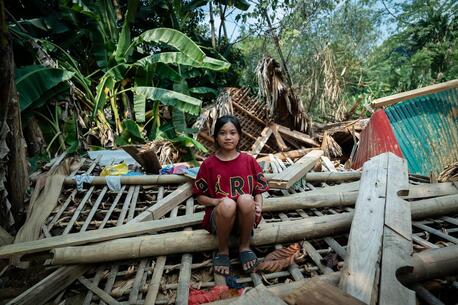
Youth Climate Activists Help Businesses Become More Sustainable
For teen activists Devishi Jha and Isabel LoDuca, joining their high school UNICEF Club ignited a passion for advocacy work.
In years past, we've seen millions out on the streets calling for climate action, but because of COVID-19, children and young people are taking climate activism online and are speaking out on the child rights crisis that is the climate crisis. This Earth Day, we introduce you to two young climate activists who are spreading the word about the importance of championing climate action now and are addressing this child rights crisis head-on.
Devishi Jha, 18, a senior at Valparaiso High School in Indiana who will be entering Harvard University in the fall, and Isabel LoDuca, 19, a freshman at the University of Michigan, are climate activists, entrepreneurs and best friends. Together they founded Voyagers, a youth-led platform and community that presses private businesses to adopt sustainable practices for their supply chains. Their staff of seven high school and college students, aided by an advisory board of adults from the business world including Desta Raines, Director of Sustainability at Sephora, has worked with brands like IKEA, Clif Bar & Company and Proctor & Gamble.
[UNICEF Advocacy Day] made me realize I could do something as a student, something as cool as meeting my representatives, influencing policy and creating change. — Devishi Jha, 18
The two became friends when their high school UNICEF Club attended the UNICEF UNITE Annual Summit in Washington, D.C. Advocacy Day, in particular, made a great impression on them as they saw young people their age taking action and speaking out on issues that mattered to them. “It made me realize I could do something as a student, something as cool as meeting my representatives, influencing policy and creating change.” Jha says.
“During the Summit, I came to the conclusion that non-partisan solutions are possible if you bring people together, focused on a core mission, using one’s voice not directed towards shaming anyone but instead to uplift others," says LoDuca. "And we as young people can take the same approach with adults, with established brands, when talking about sustainability.”

Friends and activists Isabel LoDuca, left, and Devishi Jha in Valparaiso, Indiana in April 2021. They share a passion for advocacy that began when, as members of their high school UNICEF Club, they attended the UNICEF UNITE Annual Summit in Washington, D.C. © photo courtesy of Devishi Jha
Their passion for advocacy work and UNICEF grew, as Isabel later became a youth representative and an advocacy lead for the Midwest, and Devishi currently serves on the retention team of the UNICEF USA National Council.
Gen Z will be the largest generation with the most buying power in the coming years, and this generation cares about businesses taking accountability for their ecological footprint. — Isabel LoDuca, 19
In April 2020, they founded Voyagers. They specifically wanted to focus on the intersection of business and sustainability. “We noticed that there are so many young consumers that care about sustainability, and we wanted to get the conversation going between businesses and Gen Z. To get companies to speak about what they’re doing and what product they’re selling in the context of diversity, equity and inclusion, human rights and of course climate change,” Jha explains.
Meshing sustainability with corporate America is no easy task. But it makes sense from a business standpoint, according to LoDuca: “Gen Z will be the largest generation with the most buying power in the coming years, and this generation cares about businesses taking accountability for their ecological footprint.”
What Jha and LoDuca are doing with Voyagers is helping speed along that process. Not only do they want companies to look inward, by questioning the sustainability of their business model, their supply chain and the products they’re selling, they also want businesses to look outward and take youth voices into account when it comes to their brand’s sustainability journey. “That’s where we as young people come in, helping brands to become more Gen Z consumer-facing by giving young people the chance to advise them and bring in their ideas on the future,” LoDuca says.
The end goal of this is preserving our planet's resources, and that is what we as young people care about. — Devishi Jha
Jha and LoDuca think that in the long run, sustainability will prove profitable and even give brands a competitive advantage. “We’re already seeing the success of companies implementing youth advisory boards and listening to the people that represent the future. The end goal of this is preserving our planet's resources, and that is what we as young people care about,” Jha notes.
Both feel that helping brands become more sustainable is worth all the hustle that comes with running a growing start-up. They want to empower other young people to take risks, follow their passion and know that they can create their own business if they want to. “Young people all around are doing crazy, incredible things. And what the pandemic has shown us is that you can start a business from your house if you like,” says Jha.
“The voice of a young person holds great value,” adds LoDuca, "It’s important to surround yourself with like-minded people who care as much about something as you do and bring different perspectives to the table on a particular subject.” Despite all of this, they both agree that it’s also important to take breaks and to just hang out. In their case, that means grabbing pasta salad at their favorite restaurant together.
Want to help protect the world's children from the impacts of climate change? Urge your Members of Congress to take action now.
UNICEF USA does not endorse any brand, company, product or service.
Top illustration: Climate change impacts societies, economies and ecosystems. Young people are taking action to preserve the health of the planet, conserving more, buying less and working toward a sustainable future. © UNICEF
HOW TO HELP
There are many ways to make a difference
War, famine, poverty, natural disasters — threats to the world's children keep coming. But UNICEF won't stop working to keep children healthy and safe.
UNICEF works in over 190 countries and territories — more places than any other children's organization. UNICEF has the world's largest humanitarian warehouse and, when disaster strikes, can get supplies almost anywhere within 72 hours. Constantly innovating, always advocating for a better world for children, UNICEF works to ensure that every child can grow up healthy, educated, protected and respected.
Would you like to help give all children the opportunity to reach their full potential? There are many ways to get involved.




